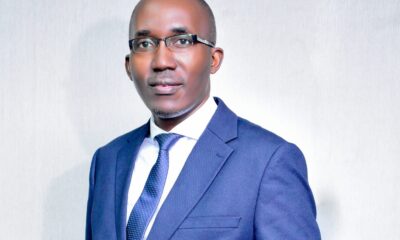Ramathan Ggoobi
Mutebile for Guinness book of world records
He is the first man to win an award for solving a problem he created!
For the first time in nearly three years, Bank of Uganda (BOU) Governor Emmanuel Tumusiime-Mutebile is in the news for the right reasons. He was recently voted the best central bank governor in Africa for the year 2013. The Africa Investor Group recognized Mutebile “for his efforts in stabilising prices and steering the economy from turbulent times.”
Sections of the media have since been pouring oceans of ink, congratulating the veteran economist for winning the award. Some have dedicated full sections of their business space to this cause!
Far from feeling envious of a man whom I have no doubt has been instrumental in reforming Uganda’s economy since 1987, my damn feeling is that Mutebile was a very lucky to retain his job to date, let alone winning the award for the best governor.
The last three years have been the worst years for both Mutebile as governor of BOU and for the Ugandan economy. The downturn began in 2011 after the general elections. Immediately after the elections in February, inflation rose from 6.4% to 11% in March before jumping to 14% in April 2011, steadily climbing and peaking at 30.4% in October 2011.
Both the BOU and government attributed this galloping inflation (the highest since the recovery program of 1987) to supply-side rigidities — particularly food shortages due to drought and floods, and high fuel prices following the drop in supply of oil as a result of the geopolitical tensions in North Africa and Middle East.
Purchase of fighter jets
When some people attempted to attribute the inflation to printing of money that was pumped into the economy during the February 2011 general elections (kicking off demand-pull inflation), both government and BOU rubbished the suggestion. They denied any possibility that the inflationary tendencies were demand-driven. I am one of those who agreed with the authorities’ explanation.
Soon, however, a number of events and unintentional revelations worsened the inflationary pressures. Notable among the events that catalyzed the inflationary pressures was the infamous walk-to-work that began in April 2011 by opposition politicians under their so-called Activists for Change (A4C) demonstrations.
The situation was further worsened by two revelations. In June 2011, Governor Mutebile told Financial Times’ Katrina Manson that government had raided the Treasury and took off with $720m, about two months of the country’s reserves, to purchase fighter jets. Although Mutebile later denied having let out government secrets to the media, the damage was irreparable.
Like I wrote in this pages in March last year, Mutebile, in his characteristic style, ran to the Financial Times to get the blame for the then fast-deteriorating economic situation off his sleeves, to the attention of his “friends” at the IMF and the World Bank. Little did he know that speculators were out to take advantage of his reckless utterances and drive our shilling to a record low!
The shilling sank so low, to the gladness of the political animals that this country has bred in crowds and soon the rumour mill was running in gear number five. A popular headline in social media thus, “Mutebile has resigned as BOU Governor,” paced around the world. The prophets of doom had taken advantage of the resignation of the Afghanistan’s Central Bank Governor at the time to get their message home. The pit in which the shilling was falling could only become deeper.
Basajjabalaba scandal
Five months later another damaging revelation came out. Ugandans came to learn that Hassan Basajjabalaba had been offered Shs. 142 billions as compensation for three markets that government had taken away from him to avert a political crisis in Kampala. A Parliamentary investigation unearthed a big fraud involving not only senior government ministers but also BOU Governor Mutebile. Parliament demanded for Mutebile’s resignation for his role in the fraud. Mutebile, typical of him, faced the cameras and roared, “Only God can take me out of this chair.”
Mr. President, you went ahead to back up Mutebile’s avowal when you pleaded with MPs on the Public Accounts Committee (PAC) to spare him, arguing thus, “While Mutebile erred in not consulting (before giving Basajjabalaba billions of taxpayers’ money over and above the agreed upon amount), for the sake of the economy he should be spared.”
Spared he was, but the market had lost the trust in him. Anyone privy to monetary economics knows that the position of Governor of central bank is critical as far as the health of the macroeconomy of a country is concerned.
Before these scandals, Mutebile was a very successful Governor mainly because everyone, literary everyone — from the executive to parliament, to the general public and the development partners — had confidence in him. That confidence shrunk with the scandals and with it the value of the shilling.
These scandals of 2011 at Mutebile’s BOU certainly left our financial markets vulnerable to speculative volatility. In the same year, for example, Bloomberg News agency ranked Ugandan shilling as the World’s worst performing currency. It is still limping.
OPM scandal
My question, therefore, is if Mutebile was key in causing the economic troubles of 2011, what makes him a deserving candidate and winner of the best central bank governor? True, he later put together a package of monetary interventions that lessened the inflationary pressures, but why should one be rewarded for solving a problem he created?
How did Mutebile cause the crisis he later solved? First, he is the gatekeeper for Uganda’s international reserves. The BOU has the responsibility of keeping safe our reserves. Mutebile lamented to the Financial Times thus, “[Museveni] gave me some promises which he has not kept – like a way to redress the reserves. I’m still fighting with him.” This was a clear testimony that the governor had entered into an agreement with the executive to irregularly use reserves to purchase the fighter jets.
Mutebile cannot and did not give any explanation how this illegal transaction was conducted. He could not and should not cite political pressure. The BOU was given independence in the 1995 Constitution that insulates it from political pressure. Article 162 (2) states thus, “In performing its functions, the Bank of Uganda shall conform to this Constitution but shall not be subject to the direction or control of any person or authority.”
So the fact that Mutebile’s illegal decision, to “lend” our reserves to the executive to purchase jets, sparked off a speculative attack on the shilling which accelerated the inflationary pressures, makes him culpable and thus unfit to continue holding that important office, let alone winning awards.
Therefore, if Uganda was a morally upright and a law abiding country, this and other scandals, such as the Basajjabalaba saga mentioned above and the Office of the Prime Minister (OPM) and the Ministry of Public Service mega corruption scandals where BOU was again involved, should not have left Mutebile at the helm of our economy.
BOU’s single mandate
In my view, if the economy got battered by the high inflation of 2011, to require a saviour in Mutebile, mainly because of the abovementioned irregularities, the same man should first face the “executioner” for having been the prime perpetuator of the economic tragedy that actually continues to afflict pain to millions of Ugandans.
People have lost and continue to lose their homes and other properties to banks, because the 2011 inflation (and the resultant lending rates hike) failed them to clear their loans. The economic projections are still bleak.
Secondly although the BOU has managed to mechanically bring the inflation down to 8%, the unemployment rate is growing every passing day. Millions of youth that get out university cannot find decent jobs in the formal sector. Very few Uganda are lucky to secure a formal job. Thousands of those who hold job lottery tickets reading “unlucky” have resorted to the informal sector where they forge life as boda-boda riders, vendors, bar attendants and “musicians”!
I have for years been challenging the BOU’s single mandate monetary policy of pursuing price stability without focusing on the employment and sustained economic growth. This so-called inflation targeting regime of the BOU has caused a sacrifice ratio, high unemployment rate, high lending rates, volatile exchange rates, and unstained GDP growth. It is thus not serving the ultimate purpose of monetary policy — advancing the country’s economic well-being.
Perhaps a double mandate BOU (pursuing both price stability and employment) would do a better job. But who would listen to this? Certainly not the award-winning Mutebile; religiously hyped by the unsophisticated and economically ungrounded media and Uganda’s political class. No doubt Mutebile was instrumental in reforming Uganda’s economy from the ruins and distortions caused by Idi Amin and Milton Obote. However, he seems to have run out of ideas to manage an economy that is out of the reform phase.
Ugandan economy has moved from the recovery phase to an emerging, growth-based phase. It requires new ideas and managers that are ready to take risks away from the traditional price stability stance. We need more jobs; we need more investments; we need more output levels, all deliberately pursued but not subsumed to emerge out of price stability. Empirical evidence has shown that this ‘divine coincidence’ is not guaranteed.
Comments


























